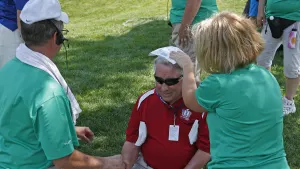More Stories

Ready to go on a trip? Keep a first aid kit ready to help with scrapes, cuts and burns.
Remember to pack one in your car if you’re hitting the road.
Here are some helpful products to include:
Antiseptic or alcohol wipes
These can help prevent bacterial skin infections from minor cuts or scrapes.
Gauze and bandages
All first aid kits should contain several sizes of bandages as well as a roll of gauze.
First aid tape
Tape is used to adhere gauze to wounds until they heal.
Blister pads
If you already have a blister or a hotspot, these will prevent added damage to the area.
Bug spray
Use Environmental Protection Agency (EPA)-registered insect repellents containing DEET, picaridin, IR3535, Oil of Lemon Eucalyptus (OLE), para-menthane-diol (PMD), or 2-undecanone. Find the product that best suits your needs here. Always follow product instructions. Do not use products containing OLE or PMD on children under 3 years old. Here are some tips to prevent tick bites.
Antibiotic ointment
This cream or gel should be applied to clean wounds to prevent infection.
Over-the-counter pain relief
Include things like Acetaminophen, Ibuprofen, Antihistamine, and antacids or other stomach relief tablets. Here are some other items to consider packing.
Lotions and ointments
Calamine lotion or an over-the-counter hydrocortisone ointment can help with bug bites, poison ivy, and other skin irritants. Sunscreen with UVA and UVB protection, SPF 15 or higher. And aloe can help moisturize your skin after sun exposure. Here are some tips to help protect your skin from sunburn.
Hand sanitizer
Use hand sanitizer, containing at least 60% alcohol, or or antibacterial hand wipes to help keep your hands clean and prevent the spread of illnesses.
First aid-rated tweezers
These tweezers are usually made of plastic and are designed to remove glass, splinters and other debris from cuts and wounds. Or to remove a tick - learn how to do it here.
Latex gloves
Always use gloves when treating someone with a wound.
Digital thermometer
Check your temperature if you have a wound to ensure you don't have a fever, since this may indicate a possible infection. It can also help to have one if you start feeling sick. Please be sure to check with each state/destination for its current COVID-19 guidelines before planning a visit.
Traveling with pets?
These tips will keep your dog happy during a road trip!





